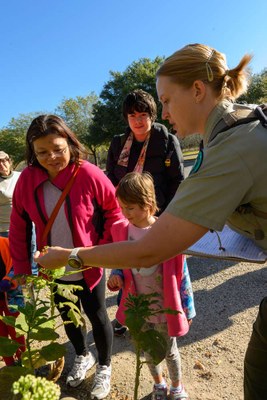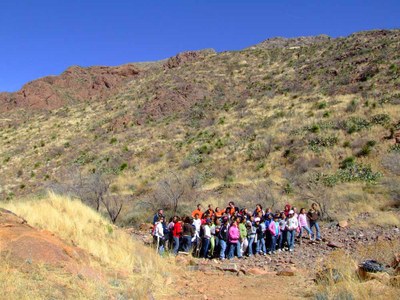Field Trip Information
 Field trips to a state park or state natural area can introduce your students to concepts in the field and reinforce learning. Our rangers are ready to help!
Field trips to a state park or state natural area can introduce your students to concepts in the field and reinforce learning. Our rangers are ready to help!
Find a park near your school.
Things to know
- Cost:
- Field trips in Texas State Parks are free for students, teachers and chaperones. Parents not acting as chaperones may have to pay full park entry fees. Read more information about chaperones.
- We may charge a small per-student material fee for specific programs. Ask about this when you schedule a trip.
- Scheduling:
- Schedule as far in advance as possible, especially in the spring, when most field trips happen.
- Financial aid:
- CO-OP grants can cover transportation costs, food for students, and certain equipment.
- TEKS:
- Most field trip curricula are TEKS-aligned.
- Let the park know ahead of time if you’re hoping to meet a specific standard.
Scheduling a field trip
When you call to schedule a field trip, be ready with:
- Name, address, phone number and email of the school
- Teacher and contact person (if different)
- Number of students and grade level
- Preferred and alternate trip dates
- Time of arrival AND time available for the learning experience
- Educational objectives for the visit
- The type of program you would like (ranger-led or self-guided - visit our Activities page for ideas)
Chaperones
Proper supervision promotes safety, whether students are working as a class or in small groups. We require a minimum of one adult for every 12 to 15 students.
All chaperones must clearly understand their disciplinary authority. They are to remain with students during the entire program. Chaperones do not have to pay an entry fee.
Discipline
Discipline is the responsibility of teachers and chaperones.
Explain to your students that we expect appropriate, orderly behavior throughout their visit. Simple rules of respect for all park resources, courtesy toward each other and park staff, and being mindful of other people in the park will ensure a quality learning environment.
All plants, animals, minerals, fossils, and artifacts are protected by state law and may not be disturbed.
Preparation
Teachers
Before your field trip:
- We recommend a preview visit to the park. This will familiarize you with the location of parking, picnic areas, restrooms, water fountains, trails and accessibility to the site.
- Request a free teacher’s guide.
- Explore outdoor areas you plan to visit.
- Identify activities relating to your classroom studies.
Students
 Be sure your students know:
Be sure your students know:
- The date, time and point of departure to leave school
- Educational objective of the trip
- Necessary expenses
- Lunch plan
- Appropriate dress
- Permission forms as required by school
- Rules (of teacher and of the park)
- Field trip supplies (ex. camera, notebook, pencils, art supplies, etc.)
- Special assignment/worksheets
- Free time
- Time and point of departure to return to school
